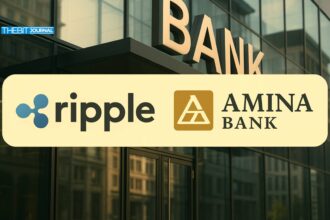The cryptocurrency market is ever-evolving, with new innovations making waves and old favorites continuing to show strong potential. This week, there’s a lot of buzz around Qubetics, Kaspa, and Stacks—each offering unique advantages for those looking to diversify their portfolios. Whether you’re a seasoned investor or a beginner looking to get started, these projects offer something for everyone.
Qubetics, in particular, has caught the attention of both newcomers and experienced investors. With its presale currently in full swing, Qubetics has raised over $12 million and sold more than 462 million tokens to over 18,700 holders, creating quite the buzz. The project’s focus on cross-border transactions sets it apart, addressing real-world challenges that other cryptocurrencies have yet to solve. In a world that’s becoming more interconnected, Qubetics might just be the next big thing.
Kaspa, on the other hand, is making waves for its speed and scalability. With its cutting-edge GhostDAG protocol, Kaspa is quickly becoming a contender for one of the top 10 cryptocurrencies by 2026. Meanwhile, Stacks is creating a buzz by bringing smart contract capabilities to Bitcoin, providing developers with a platform to build decentralized applications while leveraging Bitcoin’s security.
In this article, we’ll dive deep into why these three cryptos—Qubetics, Kaspa, and Stacks—are making waves and why they should be on your radar this week.
Qubetics: The Presale That’s Changing the Game
Qubetics has emerged as one of the most exciting crypto projects this week. Its presale has already raised over $12 million, and the excitement is only growing. The Qubetics token, $TICS, is currently priced at $0.0667 in the 20th stage of its presale, and analysts are predicting significant ROI at different stages. With a projected ROI of up to 14888% after the mainnet launch, it’s easy to see why investors are scrambling to get in while they still can.

But what makes Qubetics stand out from the crowd? It’s their focus on cross-border transactions—something that traditional cryptocurrencies have struggled with in the past. Qubetics is offering a solution that makes cross-border payments faster, more affordable, and easier to execute than ever before. In today’s global economy, this feature is a game-changer.
For businesses, this could mean the ability to send payments across borders without the hefty fees that are typically associated with international transactions. Professionals working with international clients could also benefit from faster transaction processing times, cutting down on delays and improving overall efficiency. And for individuals, this could open up a new world of possibilities when it comes to sending money to family or friends overseas.
Real-Life Examples of Cross-Border Transactions with Qubetics
Imagine you’re a small business owner in the U.S. who needs to pay a supplier in Europe. With traditional banking methods or even other cryptocurrencies, you could face high transaction fees and long processing times. With Qubetics, however, you can make the payment within seconds—without worrying about expensive fees or delays.
On a more personal level, think about someone living in Canada who wants to send money to a family member in Mexico. With Qubetics, the process would be straightforward and cost-effective, all while ensuring the transaction is secured through blockchain technology.
Kaspa: Speed and Scalability in Blockchain
Kaspa is quickly becoming one of the most talked-about cryptocurrencies for its groundbreaking speed and scalability. Unlike traditional blockchains that process transactions sequentially, Kaspa’s unique GhostDAG protocol allows multiple blocks to be confirmed simultaneously, making it one of the fastest proof-of-work blockchains in the market.
With Kaspa, transactions are confirmed in seconds, which means businesses and individuals can send payments in real-time without worrying about congestion or high fees. The blockchain’s scalability is another key feature that has investors excited. As more and more users join the network, Kaspa’s GhostDAG protocol ensures that it can handle the increased demand without compromising speed or security.
For businesses that rely on fast and secure transactions, Kaspa presents a solution that’s ready for the future. Whether it’s for day-to-day transactions or large-scale operations, Kaspa is building the foundation for a more efficient blockchain ecosystem.
Stacks: Bringing Smart Contracts to Bitcoin
Stacks is a unique project that aims to solve one of Bitcoin’s biggest limitations—its lack of programmability. While Bitcoin is widely regarded as the most secure blockchain, it’s not very flexible when it comes to running smart contracts or decentralized applications (dApps). Stacks addresses this limitation by creating a layer-2 solution that enables smart contracts on top of Bitcoin.
By using a mechanism called “Proof of Transfer” (PoX), Stacks anchors its blockchain to Bitcoin’s security model, allowing developers to build dApps that are both secure and scalable. This feature is crucial for the growing decentralized finance (DeFi) ecosystem, which relies on smart contracts to facilitate transactions without intermediaries.
Stacks’ growing ecosystem of dApps and projects, including CityCoins, is proof that there’s demand for Bitcoin-native decentralized applications. For developers, Stacks presents an opportunity to build on the most secure blockchain while offering the flexibility and programmability that today’s dApps require.
The Importance of Cross-Border Transactions in Blockchain
In the world of blockchain, cross-border transactions are an essential feature. Whether you’re sending money to a family member overseas or making a payment to an international supplier, blockchain technology offers a solution that traditional financial systems cannot match. The speed, cost-efficiency, and security that blockchain provides make it the perfect tool for enabling global transactions.
Cross-border payments traditionally come with high fees, long processing times, and a lack of transparency. Blockchain, however, eliminates these barriers by providing a decentralized network that can process transactions in seconds, often with little to no fees. For businesses, this means faster cash flow and fewer barriers to global trade. For individuals, it means more affordable and efficient ways to send money to loved ones.
As blockchain continues to evolve, projects like Qubetics are making cross-border transactions even easier, paving the way for a future where sending money across the globe is as simple as sending a text message.

Conclusion
As the cryptocurrency market continues to evolve, Qubetics, Kaspa, and Stacks are emerging as key players that offer something unique to the table. Whether it’s Qubetics’ cross-border transaction focus, Kaspa’s speed and scalability, or Stacks’ ability to bring smart contracts to Bitcoin, these projects are pushing the boundaries of what blockchain can do. For investors looking to diversify their portfolios this week, these three cryptos should definitely be on your radar.
If you’re looking to get in on the ground floor, Qubetics’ presale offers an incredible opportunity to purchase $TICS tokens at $0.0667, with analysts predicting significant ROI after the presale ends. Whether you’re a long-term investor or someone looking to make a quick move, the time to act is now.

For More Information:
Qubetics: https://qubetics.com
Telegram: https://t.me/qubetics
Twitter: https://x.com/qubetics
FAQs
- What is Qubetics and why is its presale important?
Qubetics is an innovative cryptocurrency project focused on improving cross-border transactions. The ongoing presale has raised over $12 million and has garnered significant attention for its potential to solve real-world challenges related to international payments. With its token, $TICS, priced at $0.0667 in the 20th stage, it’s creating waves in the crypto space due to its ability to offer faster, cheaper, and more secure cross-border transactions.
- How does Kaspa improve blockchain scalability?
Kaspa stands out because of its unique GhostDAG protocol, which allows the blockchain to process multiple blocks simultaneously. Unlike traditional blockchains, which confirm transactions sequentially, Kaspa’s approach improves speed and scalability, making it one of the fastest proof-of-work blockchains in the market. This ensures that transactions are confirmed within seconds, offering businesses and individuals a fast, reliable solution for their cryptocurrency needs.
- What makes Stacks different from Bitcoin?
Stacks is a layer-2 solution designed to bring programmability to Bitcoin by enabling smart contracts and decentralized applications (dApps) on top of the Bitcoin blockchain. While Bitcoin itself lacks smart contract functionality, Stacks leverages Bitcoin’s security model to allow developers to build scalable and secure dApps. This gives developers the flexibility to innovate while benefiting from the robustness and security of Bitcoin.
- Why are cross-border transactions important in blockchain?
Cross-border transactions are essential in today’s global economy. Blockchain offers a decentralized and secure platform that reduces the need for intermediaries, allowing for faster and cheaper international payments. Traditional methods often come with high fees, long processing times, and limited access. Blockchain, however, addresses these issues by providing a direct and efficient way to transfer funds across borders, making it a valuable tool for both businesses and individuals in a globalized world.
- How can I invest in Qubetics?
To invest in Qubetics, you can participate in the ongoing presale. Tokens are priced at $0.0667 in the 20th presale stage, with analysts predicting significant returns once the presale ends. As of now, over 462 million $TICS tokens have been sold to more than 18,700 holders. By purchasing $TICS tokens now, you position yourself to benefit from potential returns after the presale concludes and the project’s mainnet launches.




























